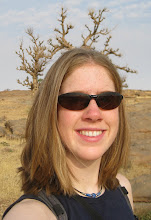Yup, that's right, I eat beans. I have been at my homestay site outside of Bamako for the last two weeks, and am now known as Aminata Traore. It turns out that the Traore's are known bean eaters. I'll have to explain more about this later when I know more about “joking cousins.” All I know is that it's a good thing I like beans, otherwise I might be taking more offense to people telling me how much I like beans. It's also a good thing I brought the bean game with me to Mali...once my Bambara is better I'll be able to teach the game to some Malians...what better way to celebrate how much I like beans. It has been a really good couple of weeks at homestay. We have 4-6 hours of language classes a day, then go home to our Malian families and practice what we have learned. Most days have been very overwhelming because we are learning so much so fast. Since I am in a small village with 5 other volunteers, we try to meet up every once in a while to play cards and speak English. I am really lucky to have really great fellow volunteers at my site. I could probably talk for hours about the last two weeks in Mali, but I'll try not to be so verbose...instead I'll share some interesting bits, and then pictures!
-Malians generally think Americans are dirty because we use toilet paper. Americans generally think Malians are dirty because they use a salidaga instead of toilet paper.
-Malians think Americans are dirty because we only shower once a day. I now take 2-3 bucket baths a day, as they're a great way to cool down in the heat, and since I am constantly dripping sweat in Mali, I kind of need 2-3 bucket baths a day!
-I usually eat to ever night for dinner, and it is actually pretty good. I wasn't so sure about it to start, but I don't mind it now.
-Let's not talk about the intestinal difficulties that 90% of the trainees are having...
Now for pictures! I live with the Traore family (Tarawele), which consists of about 30 people total. My togoma (the woman I was named for) is the matriarch of the family...her four sons and their wives all live in the same compound, about 50 m x 50 m. There are somewhere around 20 kids running around, some are older and have families of their own, and the youngest was born just two weeks ago! Last week we had a baptism for the baby, one week after he was born. His name is Sidi. The baptism was a lot of fun because we got to dance around for 2 hours! Here is a picture of the beginning of the festivities, I'm the tall white person in a blue shirt, the woman in pink is my nextdoor neighbor Geisha, the woman in bright green is one of my mother's, Adja, and the white woman in a grey tshirt is Kristin, a fellow volunteer:

Here are some pictures of the family, this is Adja, one of my four host mothers, with her youngest child Karamogo, and Tia, one of my favorite sisters:
This is Oumou and her youngest child Salimata. Oumou knows some French, and I know some French, so we have been able to communicate a little bit when my Bambara fails (which is more often than not...). I usually hang out with her and her husband Secouba at night, drinking tea or powdered milk, depending on whether or not I need to sleep.

Here is the Bamba (this one is for you, Rolf!), or crocodile. The man who owns it is a griot that plays music for hunters, and a hunter gave this crocodile to him when it was a baby. The crocodile is now 17 or so, and eats frogs, or meat when the owner can afford to buy meat.

Here is the garden that we have been working on, we've planted lettuce, carrots, beans (of course!), tomatoes, eggplant, marigold, squash and cucumber so far. We've been learning a lot about composting and planting gardens in Mali.

Last but not least, here is a short video of a huge storm that came through yesterday afternoon. I don't think the intensity of the storm quite comes across in this video. The storms in Mali seem to come hard and fast. And, then they're over in 30 minutes or so. There is usually constant rumble of thunder, and lightning all around, and rivers running everywhere after the storms. Rainstorms usually make the trainees happy because they drop the temperature by 20 degrees or so. My host mom told me that it rains even more in August, so we'll see. NOTE 7.27.09: Due to internet problems, and the fact that videos take forever to upload...no video with this post, sorry!
That's all for now, I'll try to write again when I get back to the internet in a couple of weeks!















